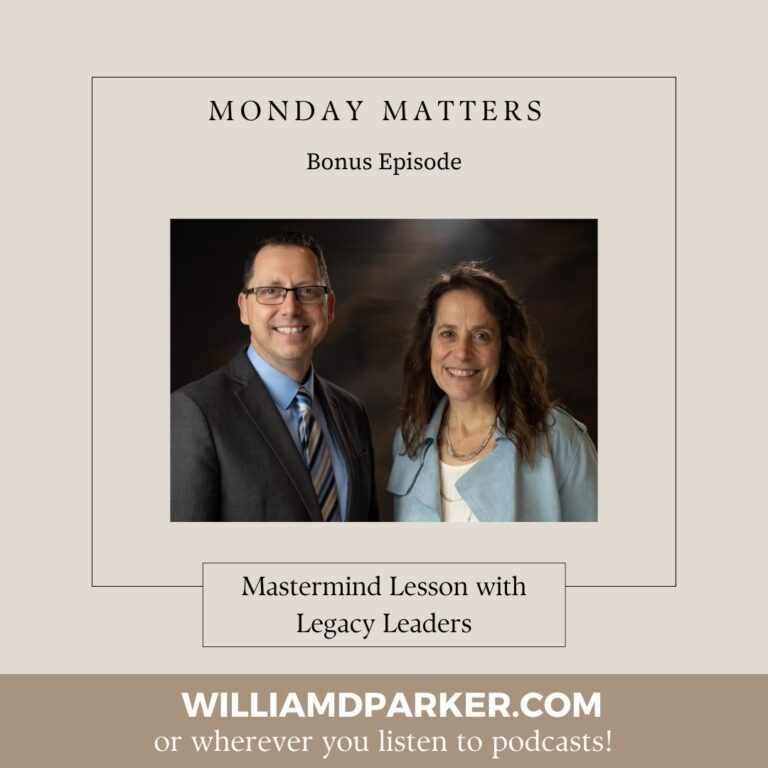Podcast: Play in new window | Download
During my first two years in school admin, I barely slept, rarely exercised, and seldom had time for my family.

I’ll never forget the night I was up late after my wife and I had put our four kids to bed. I had my laptop open when my wife sat down beside me.
“Will,” she said. “There’s something I need to say. The kids and I have accepted that you are a husband and dad on the weekends. The rest of the time, the school owns you.”
She didn’t say this with bitterness or anger, just simple resignation.
“In fact,” she concluded, “You just seem a shell of the man you used to be.”
I remember watching her leave the room, and I just sat there. I was giving everything I had to my work as a school leader. But in the process, I was abandoning those closest to me.
That night I made a decision. I opened my laptop and wrote a letter of resignation and placed it in a folder. The next morning I placed that folder on the corner of the desk in my office. Every time I looked at it, I would tell myself that either I was going to find a more balanced way to lead, or I was changing professions.
Thankfully, I began to slowly regain some balance in my personal life. And over the last twelve years, I think my wife and family would agree that I’m healthier because of it.
At the same time, I often run into weeks or seasons at work where the pace and stress can feel overwhelming. If you’ve read my blog before or listened to my podcasts, I talk a lot about ways to manage projects, increase efficiency, and surround yourself with valuable team members. All of these tips and lessons I’ve learned help us manage our time and energy more efficiently.
But no amount of courage, efficiency, or teamwork can protect you from the inevitable seasons of stress that come with any job involving service to others. That’s why I occasionally need to revisit my “letter of resignation” moment. Sometimes I do that by stealing away to my piano in the evening before bed. At other times, it is time in the backyard throwing football with my son, Jack. As a person of faith, this also includes practicing cycles of rest and worship.
Protecting One Day Each Week
I remember when I was in my fifth or sixth year of teaching, I realized I never really stopped working, even on the weekends. As a young Language Arts teacher, my weekends were usually consumed with chores, grading papers, and prepping for the upcoming week. One week, however, I made a commitment to schedule all my activities so that I could really take Sunday off to focus on worship and rest. What surprised me was how much more energized, creative, and productive I felt that next week. This soon became a habit. Occasionally I make exceptions to this plan, but for the most part I find myself more relaxed and focused each week when I can really rest before returning to work.
But no practice or habit is a silver bullet. When I became an assistant principal, for instance, I still practiced this weekly ritual, but it didn’t insulate me from the stresses I experienced in overcommitting myself to my new tasks in school leadership. Perhaps my habit of weekly rest helped me not completely implode, but I had to figure out how to apply this rhythm throughout my day and week where possible.
7 Simple Daily Routines
While I don’t pretend that my own experience is a perfect model for others, I am willing to reflect on some of the habits that have helped me over the years. At the risk of sounding like a grandpa, let me share some very simple take-aways. If you’re interested in ways to build routines of re-filling your emotional tank into the days and weeks of your school year, here are seven tips:
1. Arrive early.
I make it a habit to be the one who opens up the school in the morning. This gives me an opportunity to check my email, calendar, in-box, and gather my thoughts. Sometimes it allows me a few minutes of reading. Now I’ve also have a special needs student who visits me every morning for a short conversation. At times his visits cut into my prep-time, but it’s worth it and also reminds me why I’m in the business of serving students. Think about how you can provide space into your mornings to gather your bearings before the day begins.
2. Allow others to settle in.
Because you usually have a long list of to-do’s, it would be easy to begin delegating or problem-solving when your team arrives. Instead, it’s important to also give others time to settle in, gather their wits, and put out their “small fires” of morning visitors, substitute sign-ins, or student requests before first bell rings. Think about your team members and allow them time to gather their bearings each day. After students have reported to classes, and a small sense of calm is established, then you can touch base on tasks that may need attention from team members.
3. Be present and visible.
My students are required to wait in our commons area (or cafeteria) until the first bell rings for the day. Being there not only provides me to supervise but also allows me to be visible. Students need to see you and know that you’re a part of watching them prepare for school. Unless your’re already scheduled in a meeting or classroom, walk the building when the bell rings. Visibility throughout the day allows teachers and students reminders that you are invested in what they are doing each day at school.
4. Eat lunch.
I know way too many leaders who neglect good nutrition. Although eating can sometimes be hard to work around managing unexpected conflicts, it is a healthy habit and best done with others. At the risk of sounding like your grandparent, you need the energy that comes from food, and you also need the energy that comes for conversation with others—and not just about work or school topics. Interestingly, Michael Hyatt has a great post that supports this idea too.
5. Exercise.
I have a route mapped in my neighborhood that is three miles long. Every Monday, Wednesday, and Friday, I am up around 5AM and run that route. On off-days, I try to do strength-building exercises. Pick a routine that works for you, but don’t neglect your cardio-health. When blood is pumping through your brain and organs, it is carrying oxygen throughout your body, releasing endorphins, and bolstering your immune system. Your service to your school, your family, and yourself is important, and taking staying active means you’ll be able to keep serving with better endurance.
6. Laugh more.
One of the best stress relievers I’ve found is laughter. Don’t take yourself so seriously and learn to find the humor in the ridiculous moments of school. One day I was dealing with a special-needs student who had become angry and destructive. After talking in my office for an hour, his mother made her way to the school. When I led her into the office, the boy was calmly rocking back in forth in an office chair and singing “Ring of Fire” by Johnny Cash. I can be having a hard day, but every time I think about him singing that song, I laugh. So many of the stresses an intense moments of our day can be more easily managed when we learn to find the humor in them.
7. Rest.
I mentioned earlier my practice of weekly rest. This is also important each day of the week with the routines you set. Yes, I have plenty of nights where supervising a game or event makes it difficult to have an early bedtime. But I still try to avoid late night TV, and I try to practice evening routines of reconnecting with my family and reading before I sleep. And when you do have a break from school or vacation time, spend time on the simple joys of life that recharge your emotional batteries. These habits help me keep a cycle of rest and rejuvenation.
Conclusion
We all go through seasons when life is just plain hard. And there are times when my wife still sees very little of me. Although I haven’t had to write any letters of resignation lately, I have also learned to practice some cycles of rest along the way. Maybe it’s time you wrote your own letter. Not so you can find another job. But perhaps you can make a commitment to taking care of yourself so you can keep taking care of others.
Now It’s Your Turn
What is one step you can take this week to add a healthy routine to your very busy week? It may seem counterproductive to add another “to-do” to your long list, but how can you invest in self-care so that you can better serve others?
Sign-Up For Free Updates and Ebook
When you enter your email address below, you will automatically receive my newest posts and a free Ebook, 8 Hats: Essential Roles for School Leaders. Let’s keep learning together!
Subscribe for free weekly updates and receive free e-book!
(function($) {window.fnames = new Array(); window.ftypes = new Array();fnames[0]=’EMAIL’;ftypes[0]=’email’;fnames[1]=’FNAME’;ftypes[1]=’text’;fnames[2]=’LNAME’;ftypes[2]=’text’;}(jQuery));var $mcj = jQuery.noConflict(true);
Principal Matters–The Book!

School leaders are very busy, so each of the twenty-four chapters is designed as a quick-read and followed with take-action questions for follow-up or reflection. If you want practical ideas on understanding your purpose, managing school teams, dealing with challenges, and leading with courage, action, motivation, and teamwork, go HERE to pick up a copy for you or your team.


